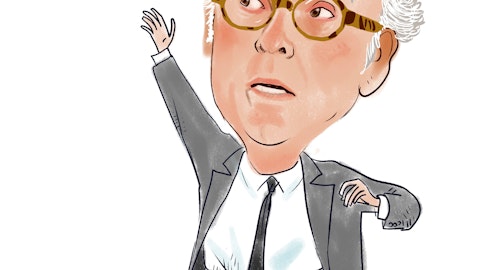Fiduciary Management, an investment management firm, published its “All Cap Equity Fund” third quarter 2021 investor letter – a copy of which can be downloaded here. The FMI All Cap portfolios declined approximately 1.0% in the September quarter compared to a loss of 0.10% for the Russell 3000 Index and 0.93% for the Russell 3000 Value Index. You can take a look at the fund’s top 5 holdings to have an idea about their best picks for 2021.
Fiduciary Management, in its Q3 2021 investor letter, mentioned PACCAR Inc. (NASDAQ: PCAR) and discussed its stance on the firm. PACCAR Inc. is a Bellevue, Washington-based manufacturing company with a $29.7 billion market capitalization. PCAR delivered a -0.58% return since the beginning of the year, while its 12-month returns are down by -5.05%. The stock closed at $85.78 per share on October 18, 2021.
Here is what Fiduciary Management has to say about PACCAR Inc. in its Q3 2021 investor letter:
“PACCAR is a highly efficient manufacturer and financier of light, medium, and heavy-duty trucks and related parts. The company reports three principal segments – Truck, Parts, and Financial Services – and a trivial Other segment, which includes an industrial winches business. In 2020, Truck and Other were 71% of sales and 37% of pretax profit; Parts was 21% of sales, 49% of pretax profit; and Financial Services was 8% of sales, 14% of pretax profit. Geographically, the United States accounted for 56% of sales; Europe, 26%; and other geographies, 18%. The company controls three brands: Peterbilt (United States and Canada), Kenworth (United States, Canada, Mexico, and Australia), and DAF (primarily Europe, Brazil, and Australia); each is supported by a strong, independent dealer network.
Good Business
• PACCAR has been a long-term organic market share gainer in its markets, aided by consistent investment, robust new product development, and a strong independent dealer network.
• The truck manufacturing industry is highly consolidated in North America, and PACCAR’s manufacturing business operates with few plants, requires little inventory, often generates negative working capital (cash in before delivery), and achieves best-in-class margins. As a result, its manufacturing return on invested capital averages greater than 20% — better than most industrial businesses.
• Parts sales have grown at a 6% compound annual growth rate (CAGR) over the last 15 years.
• Although the truck industry is cyclical, PACCAR has been profitable for 82 consecutive years.
• The company has no manufacturing debt, and the Financial Services segment is conservatively capitalized.
• The company is investing in alternative powertrain and autonomous driving technology, and commercial production of Peterbilt, Kenworth, and DAF electric trucks began this year.
• All three of the truck brands carry a premium over competitor truck resale value.
• Trucking is a necessary business, and market level replacement demand is able to be estimated.Valuation
• The stock trades at 2.5 times price-to-book (P/B) versus its 10-year average of 2.9 times.
• If Financial Services is valued at 1 times book (which is conservative given the historical performance), then PACCAR’s manufacturing business trades at 9.3 times earnings before interest and taxes.
• PACCAR trades at 13.9 times earnings per share (EPS) versus its 10-year average of 15.1 times.
• PACCAR dividend yield is 2.6%, including episodic dividends.Management
• Preston Feight has been CEO since 2019 and has been with PACCAR for over 20 years, having previously held leadership roles at DAF and Kenworth. He is an engineer by education and is well-suited to oversee PACCAR’s investments in alternative powertrain and autonomous driving technology.
• Mark and John Pigott, great grandsons of the founder, sit on PACCAR’s board, and the Pigott family is estimated to own around one-third of PACCAR shares. The founding family influence has helped management maintain a customer-first mindset and longterm view.
• Growth has been organic since 1996, and the dividend payout has averaged 50% for many years.
• Long-term executive compensation is aligned with shareholders and tied to the 3-year change in net income, return on sales, and return on capital compared with peer companies.Investment Thesis
PACCAR is a high-quality, high-return manufacturing business run by a capable management team. It is currently trading at a discount to its history on P/B due to supply chain issues. While frustrating, we believe the supply chain issues are temporary and are masking what is a solid mid-term financial outlook from new products and continued growth in the parts business. On the former, the company is currently undergoing one of the biggest product portfolio updates in its history. We believe the new products will drive solid price realization, market share gains, and earnings upside relative to expectations. On the latter, the parts business has grown at a 6% CAGR over the last 15 years and should continue to grow as PACCAR increases proprietary content on trucks and enhances the distribution network. Ultimately, we believe PACCAR is a quality compounder at an attractive valuation and have added to our position on the stock’s weakness.”

Pixabay/Public Domain
Based on our calculations, PACCAR Inc. (NASDAQ: PCAR) was not able to clinch a spot in our list of the 30 Most Popular Stocks Among Hedge Funds. PCAR was in 28 hedge fund portfolios at the end of the first half of 2021. PACCAR Inc. (NASDAQ: PCAR) delivered a -2.62% return in the past 3 months.
Hedge funds’ reputation as shrewd investors has been tarnished in the last decade as their hedged returns couldn’t keep up with the unhedged returns of the market indices. Our research has shown that hedge funds’ small-cap stock picks managed to beat the market by double digits annually between 1999 and 2016, but the margin of outperformance has been declining in recent years. Nevertheless, we were still able to identify in advance a select group of hedge fund holdings that outperformed the S&P 500 ETFs by 115 percentage points since March 2017 (see the details here). We were also able to identify in advance a select group of hedge fund holdings that underperformed the market by 10 percentage points annually between 2006 and 2017. Interestingly the margin of underperformance of these stocks has been increasing in recent years. Investors who are long the market and short these stocks would have returned more than 27% annually between 2015 and 2017. We have been tracking and sharing the list of these stocks since February 2017 in our quarterly newsletter.
At Insider Monkey, we scour multiple sources to uncover the next great investment idea. For example, lithium mining is one of the fastest growing industries right now, so we are checking out stock pitches like this emerging lithium stock. We go through lists like the 10 best EV stocks to pick the next Tesla that will deliver a 10x return. Even though we recommend positions in only a tiny fraction of the companies we analyze, we check out as many stocks as we can. We read hedge fund investor letters and listen to stock pitches at hedge fund conferences. You can subscribe to our free daily newsletter on our homepage.
Disclosure: None. This article is originally published at Insider Monkey.




